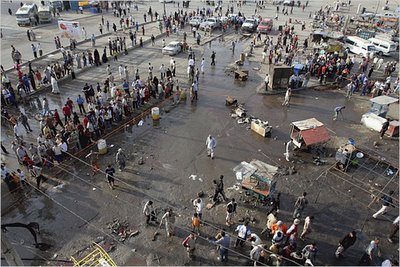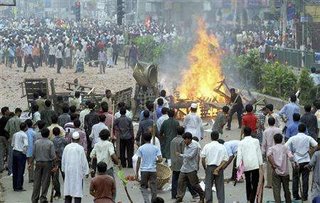Iraq
Iraq in Limbo: A new timetable on security role

Iraqis gathered Monday at the site of a bombing in Sadr City, a Shiite enclave in Baghdad. The blast, at a collections of food stalls, killed at least 31.
Published: October 22, 2006
WASHINGTON, Oct. 21 — The Bush administration is drafting a timetable for the Iraqi government to address sectarian divisions and assume a larger role in securing the country, senior American officials said.
Details of the blueprint, which is to be presented to Prime Minister Nuri Kamal al-Maliki before the end of the year and would be carried out over the next year and beyond, are still being devised. But the officials said that for the first time Iraq was likely to be asked to agree to a schedule of specific milestones, like disarming sectarian militias, and to a broad set of other political, economic and military benchmarks intended to stabilize the country.
Although the plan would not threaten Mr. Maliki with a withdrawal of American troops, several officials said the Bush administration would consider changes in military strategy and other penalties if Iraq balked at adopting it or failed to meet critical benchmarks within it.
A senior Pentagon official involved in drafting the blueprint said Iraqi officials were being consulted as the plan evolved and would be invited to sign off on the milestones before the end of the year. But he added, “If the Iraqis fail to come back to us on this, we would have to conduct a reassessment” of the American strategy in Iraq.
In a statement issued Saturday night, a White House spokeswoman, Nicole Guillemard, said the Times’s account was “not accurate,” but did not specify what officials found to be inaccurate.
The plan is being formulated by General George W. Casey Jr. and Ambassador Zalmay Khalilzad, the top military and civilian officials in Iraq, as well as by Pentagon officials.
General Casey has been in close consultations with the White House as the debate over the way forward in Iraq has intensified in recent weeks. And he and Mr. Khalilzad took part by videoconference on Saturday in a strategy meeting with President Bush and senior administration officials, including Vice President Dick Cheney, Defense Secretary Donald H. Rumsfeld, Gen. John P. Abizaid, the top American commander in the Middle East, and Gen. Peter Pace, the chairman of the Joint Chiefs of Staff.
“We’re trying to come up with ways to get the Iraqis to step up to the plate, to push them along, because the time is coming,” a senior administration official said. “We can’t be there forever.”
Until now, the Bush administration has avoided using threats of deadlines for progress, saying conditions on the ground would determine how quickly Iraq took on greater responsibility for governing the country and how soon American troops could withdraw. CBS News has reported that the Pentagon was studying these questions, but the broad scope of the steps under consideration and the benchmarks that are being contemplated have not been disclosed.
“We’ve been coordinating with the Iraqis for months on a series of measures they can take to assume more control of their country,” the White House statement said, “and to form the basis for a national compact between all communities in Iraq on the way forward.”
The idea of devising specific steps that Mr. Maliki would have to take was described by senior officials who support the plan but would speak only on condition of anonymity. Their willingness to discuss a plan that has not been fully drafted appeared intended at least in part to signal renewed flexibility on the part of the administration, and perhaps also to pre-empt the recommendations of the bipartisan Iraq Study Group, a commission led by James A. Baker III and charged with formulating a new strategy in Iraq. It is expected to issue recommendations late this year or early next year.
The plan also moves the administration closer to an idea advocated by many Democrats, who have called for setting a date for beginning phased withdrawals of American troops from Iraq as a way to compel Iraq’s government to resolve its internal divisions and take on more responsibility.
Frustration is growing among senior American military officers and civilian officials in Iraq and at the Pentagon with Mr. Maliki for his failure to move decisively against Shiite militias and on a wide range of other fronts. Even the implied threat that the administration would reassess its presence in Iraq may not be enough, senior officials said.
In Baghdad, Iraqi leaders have been watching the discussions carefully and expressing uneasiness over the growing political pressure in the United States for a troop pullout.
Tensions between Washington and Baghdad reached a new point on Monday when Mr. Maliki, who took office in May, used a telephone call with Mr. Bush to seek assurances that the United States did not intend to oust him. The White House said after the call that Mr. Bush had pledged full support for the Iraqi.
Mr. Rumsfeld alluded to discussions about benchmarks on Friday at a Pentagon news conference, noting that Mr. Khalilzad and General Casey “are currently working with the Iraqi government to develop a set of projections as to when they think they can pass off various pieces of responsibility.”
He emphasized the urgency of transferring more security and governing responsibilities to the Iraqis. “It’s their country,” he said. “They’re going to have to govern it, they’re going to have to provide security for it, and they’re going to have to do it sooner rather than later.”
But Mr. Rumsfeld was quick to play down expectations: “There’s no doubt in my mind but that some of those projections we won’t make; it will be later, or even earlier in some instances. And in some cases, once we meet the projection, we may have to go back and do it again.”
Mr. Maliki’s government has already announced its own set of benchmarks, including the establishment of a mechanism to disarm private militias. This week, the government removed commanders of the special police commandos and the public order brigade, both widely criticized as being heavily infiltrated by Shiite militias, in the first broad move against the top leadership of Iraq’s unruly special police forces.
But the surge in violence in Baghdad and other places recently has prompted consideration of even more far-reaching steps. An American official said that one proposed plan was to give the Iraqi Army the lead role in domestic security, downgrading the role of police units.
The Bush administration has emphasized building up the police this year so that they can take on the main role in providing security in many cities. The move would be another acknowledgment that the increase in sectarian violence in Baghdad and elsewhere has exposed deep problems with some police units, which have been blamed by Sunnis for carrying out sectarian attacks.
The American strategy in Iraq was thrown into disarray this week by attacks carried out by a Shiite militia in Amara, a town south of Baghdad, and by the acknowledgment from an American military spokesman that the latest plan to secure Baghdad was faltering.
In his radio address on Saturday, Mr. Bush emphasized that the administration was staying flexible in its planning and would “make every necessary change to prevail.”
Saying the goal of victory was “unchanging,”” he added: “What is changing are the tactics we use to achieve that goal. Our commanders on the ground are constantly adjusting their approach to stay ahead of the enemy, particularly in Baghdad.”
Officials said they were still debating which benchmarks to include and how long the Iraqis should be given to achieve them. The plan is likely to cover a number of Iraqi ministries, including Finance, Interior and Defense, which have struggled to varying degrees with corruption and with delivering even the most basic services, officials said.
General Casey said this month that he hoped by the end of the year to have six or seven provinces under Iraqi administrative control. Currently, there are only two. But the plan is also likely to include timelines for turning over American-run military bases, an official said.
The decision about how far-reaching to make the blueprint is likely to be influenced by what Mr. Maliki and his ministers say they can reasonably accomplish. But American officials are discussing if they should specify whether Iraqi officials deemed incompetent or corrupt should be replaced, one official said. Officials are also considering a timetable for the Iraqi Defense Ministry to have in place systems for paying, feeding and equipping its units, jobs that are still overseen to a large degree by American advisers and by contractors, some of whom have not performed well, officials said.




